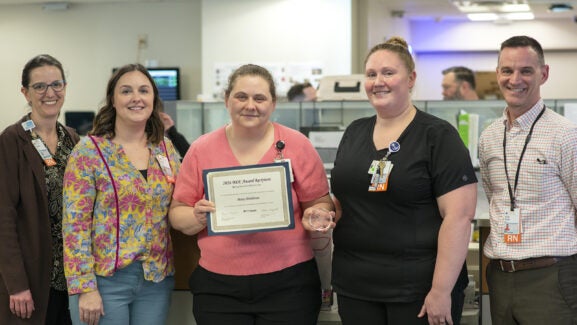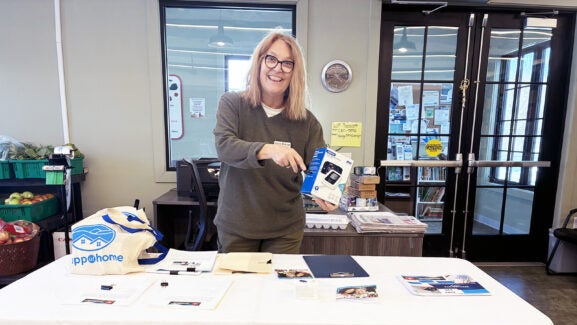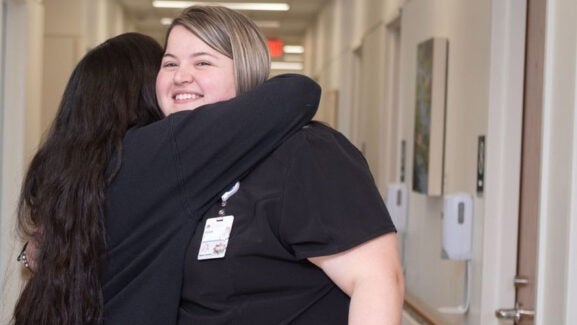
‘Enhancing Colorectal Cancer Screening’ Team Wins Charles L. Brown Award for Patient Care Quality
The Patient Safety and Quality Committee of UVA Health is pleased to announce that the winner of the 2024 Charles L. Brown Award for Patient Care Quality is University Medical Associates for their work "Enhancing Colorectal Cancer Screening: A 5-year Multi-Faceted Quality Improvement Initiative.” Congratulations to David Callender, MD, MPH, and his large and multidisciplinary team for this outstanding patient safety and quality improvement effort.
(Pictured above: Austin Matt-Beal, MEd; Callender; Elaine Mahieu, RN; and Keyri Lopez-Godoy. Not pictured: Lindsay Hauser, MS, MTTS; Cynthia Yoshida, MD; Wendy Cohn, MEd, PhD; and Melissa Warren, RN)
“After the pandemic,” said Dr. Callender, “our health system was understandably less able to keep up with the demand of colorectal cancer screening through colonoscopies alone. We saw this in primary care in that it was just harder to see a colonoscopy through from ordering to completion. We were finding that vulnerable patients were just not getting colonoscopies, and we had to become much more facile in the ordering of stool-based testing.”
“I think this work really aligns with UVA’s strategic goals of cultivating healthy communities and equity among other aspects of where UVA Health is excelling.”
The Charles L. Brown Award was created to honor the late Charles L. Brown’s service and generosity to the health system as a former member of the Health Sciences Council in the 1990s. Through this fund, $10,000 is awarded annually to a UVA Health team of faculty and staff to recognize excellence in patient care.
About the Project
The University Medical Associates (UMA) implemented a five-year, multi-faceted quality improvement initiative to enhance colorectal cancer (CRC) screening rates, especially among vulnerable and underserved populations. The project focused on educating clinicians about stool-based screening tests and addressing screening discrepancies among patients. Key interventions included comprehensive clinician education, FIT test procedures guidance, and a direct-mail FIT campaigns. These efforts improved stool-based screening adoption, positively impacting CRC screening outcomes at the clinic.
Dr. Callender said, “One of our next interests is bringing the use of FIT-DNA-based testing to all patients at UVA Health through collaboration with industry and our UVA Health financial assistance program, this will allow all of our patients to have all of the options available to them.”
Striving to Increase Screening
CRC is the second most common cancer death in the United States and the leading cause of cancer death in men under the age of 50. Clinicians and patients have options as to how they want to receive their CRC screening. There are many potential benefits and associated barriers to one screening modality vs. the other.
Dr. Callender says, “An extremely important aspect of comprehensive cancer center care is for extensive screening initiatives among populations of patients that would otherwise note probably be screened due to various socioeconomic barriers. This work I believe really tackled these issues head-on.”
The team strove to better understand the reasons that clinicians and/or patients choose or do not choose one screening modality versus the other. The work kicked off in 2019 with UVA Health signing onto the National Colorectal Cancer Roundtable’s pledge to reach 80% screening in our community. The initiative was simultaneously driven by the need to align with the American Cancer Society's updated CRC screening age recommendation, lowering it from 50 to 45 years. The project involved a multidisciplinary team from UVA Health, including UMA, the Division of Gastroenterology, and the UVA Cancer Center that developed a series of quality improvement interventions.
Years of Quality Improvement Projects
The team spent the 2019-2020 identifying current workflows for CRC screening and identified gaps in care to identify improvements to target in the system. It became clear that not all patients prefer colonoscopies and that not all clinicians are comfortable in utilizing stool-based testing. The team then carefully embarked on sequential quality improvement projects to tackle these topics:
- Resident Education: Launched in 2021, this intervention aimed to increase awareness and communication about CRC screening among providers. Educational sessions led by a resident champion focused on screening options, efficacy, and shared decision-making. This resulted in increased confidence among residents and a rise in stool test orders and returns, boosting overall screening rates.
- FIT Return Navigation: Started in 2022, this intervention aimed to improve the return rate of stool-based CRC screening tests. A two-contact point navigation protocol was developed, involving phone calls and reminder letters. This approach significantly increased FIT return rates, particularly when patients were directly engaged by navigators.
- Culturally Tailored Navigation: Implemented in 2023, this intervention adapted the navigation protocol to address cultural barriers, using bilingual navigators to improve FIT return rates among Hispanic patients. This culturally sensitive approach demonstrated higher return rates compared to other groups.
- Mailed FIT Campaign: Launched in 2024, this campaign targeted patients aged 45-49 who were not up to date with CRC screening. Patients received educational materials and a FIT kit via MyChart or USPS, with follow-up navigation for those who did not return the test. This intervention aimed to reach a broader patient base and improve overall screening rates. The analysis of this data is ongoing.
This initiative demonstrated the importance of multidisciplinary collaboration and culturally tailored interventions in improving CRC screening rates. The project’s sustainability and expansion plans include integrating FIT return navigation into clinical workflows, making available all stool-based testing options within our financial assistance program, and centralizing navigation efforts within the Cancer Center to support broader implementation across UVA Health. “It was amazing,” said Dr. Callender, “to see that despite many barriers to screening during this project, to say the least the pandemic, our screening rates increased substantially. This is a testament to the amazing work that was done by everyone involved in this project. We could not have done this work without the support of our residency program in internal medicine, the residents themselves who were willing to learn alongside us. I also want to give a huge shoutout to our navigators who really worked hard for each and every patient they interacted with.”
Latest News



